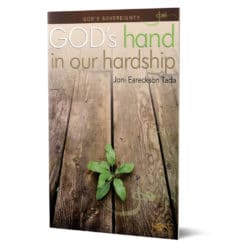The Master Craftsman

Jesus loved Martha, Mary and Lazarus in a very hard way.
Hi, I’m Joni Eareckson Tada, and when you read John 11, you’ll understand what I mean. ’Cause there’s no doubt that these three, Mary and Martha and their brother Lazarus, were deeply loved by Jesus. He sought them out; he stayed in their home where he ate and he taught. He asked about them and spent time with them. But in his love, Jesus dealt with these three in a very severe way that involved death and disappointment. And right there is a lesson, don’t you think? ’Cause if we’re close to the Lord, do not assume he will spare you from deep disappointment and, yes, even an unexpected death. Yet, there’s no doubt that Jesus thought of Mary, Martha and Lazarus as, well, his favorites. So how do you reconcile sending a tough, heartbreaking trial to someone who’s your favorite? Your treasured possession? Your intimate friend?
Well, Charles Spurgeon explains it like this; he says: “When a dealer in precious gems finds a stone of [minimal] value, little time is spent cutting it. But when a rare diamond is found, that stone will be cut, and cut, and cut again. And so, when the Lord finds a saint whom He loves much, He may spare others from hard trials, but not this one, not his chosen one, his [precious] well-beloved.” Spurgeon’s point here? Jesus refines those whom he loves greatly. Is that painful? You bet it is. But the Lord has his purpose.
Like, okay, with this example. Take a gardener. If his vineyard has an inferior tree, he lets it grow wild and takes whatever fruit it might produce. But if the tree is exceptional, he will want every branch in its proper place, and he’ll cut here and cut there because this produces more fruit. The gardener leaves nothing on the tree that would be unfavorable. Even when he grafts a branch into a fruit tree, he has to make a cut, a sharp and deep wound into the trunk of the tree in which he can insert the fragile graft – and even that is made sharp at its end by a knife. Both the graft and the tree are wounded in order to produce more fruit.
Listen to the remarkable way Hebrews 12:5 begins; it says, “And have you forgotten the encouraging words God spoke to you as his children? He said, ‘My child, don’t make light of the Lord’s discipline, and don’t give up when he corrects you.’” Wow, isn’t that fascinating? When it comes to the Lord’s discipline – that is, the trials he sends you; the cutting and the wounding – he prefaces it by saying, “Don’t forget; these are encouraging words.” And why should pain and anguish encourage us? Because it produces more fruit. The rich harvest of perseverance and patience, endurance, courage, long suffering, peace and hope and joy that’s out of this world. This is the kind of fruit that God is after – it was what he was looking for in Mary when, at first, she expressed disappointment at the death of Lazarus, her brother. But the Master Craftsman, the dealer in gems, the Master Gardener, the owner of the vineyard, he knew what he was about. Every branch he trims, he prunes and he cuts so that it will bear the fruit of the Spirit. And so today, yes, welcome that trial as a friend – it’s what Mary and Martha ended up doing when they saw God do miraculous things. Welcome the testing. And if you need prayer support to help you do it, you can always reach out to us at joniradio.org where we offer everyone hope through all their hardship.
© Joni and Friends

God’s Hand in our Hardship
Find honest, biblical answers to tough questions about God’s sovereignty. Look at how a gracious and loving God can allow you to suffer, why “good” people have to suffer and how good can come from it.




